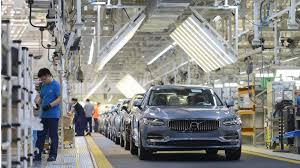Volvo Is Delaying Its IPO, the Latest Victim of Trump’s Tariff War With China

Volvo Cars has become the latest victim of intensifying global trade tensions, prompting the automaker to delay plans for a share sale and make sweeping changes to its production network to lighten the burden of higher export barriers.
Less stable market conditions that have hit carmakers especially hard have made the timing “not optimal,” Chief Executive Officer Hakan Samuelsson said Monday in a phone interview. The move comes after initial investor feedback in July was said to value the company, owned by China’s Zhejiang Geely Holding Group (gelyy), far below top-end estimates.
Volvo’s backtracking from plans — said to involve a share sale as early as this fall in Sweden and Hong Kong — shows the worsening strain from trade conflict that’s dragging on earnings and valuations of carmakers like Daimler (ddaif) and BMW (bmwyy). Volvo exports vehicles from China to the U.S., and had planned to do the reverse from a new factory in Charleston, S.C. Those plans are no longer viable as China and the U.S. engage in a tit-for-tat trade war resulting in higher tariffs on both sides, Volvo said.
“The issues around trade are hard for us because they impact cars shipped between China and the U.S. It’s a huge drawback,” Samuelsson said. “The risk is that these headwinds will increase.”
Potential plans to list Volvo’s Polestar brand, which makes high-performance electrified vehicles, remain a possibility, he said. Also on Monday, British sports-car maker Aston Martin moved ahead with its decision to list shares in London, citing the company’s turnaround as a deciding factor.
Higher Tariffs
BMW and Daimler, who both export sport utility vehicles from the U.S. to China that now contend with higher tariffs, are trading at price-to-earnings valuations of 5.5 and 6.2 times, the lowest since at least 2014. In addition to that conflict undermining global production setups, President Donald Trump has threatened to impose steeper barriers on imports from the European Union.
Volvo produces the top-line S90 sedan and compact XC60 SUV at its Chengdu and Daqing plants in China. About a quarter of the vehicles are exported, with most going to the U.S. Last week, Trump doubled down on his threats to impose higher tariffs on the nation’s goods saying he’s ready to tax all imports “at short notice.” Since July, China raised import levies on cars from the U.S. to 25%, up from 15%.
As a result, Volvo plans to use its plant in Torslanda, Sweden to ship cars to the U.S. instead, Samuelsson said, adding the impact on the XC60 would be “ok to mitigate” while the S90 would be “more difficult.” He declined to elaborate on the financial impact of the higher tariffs.


